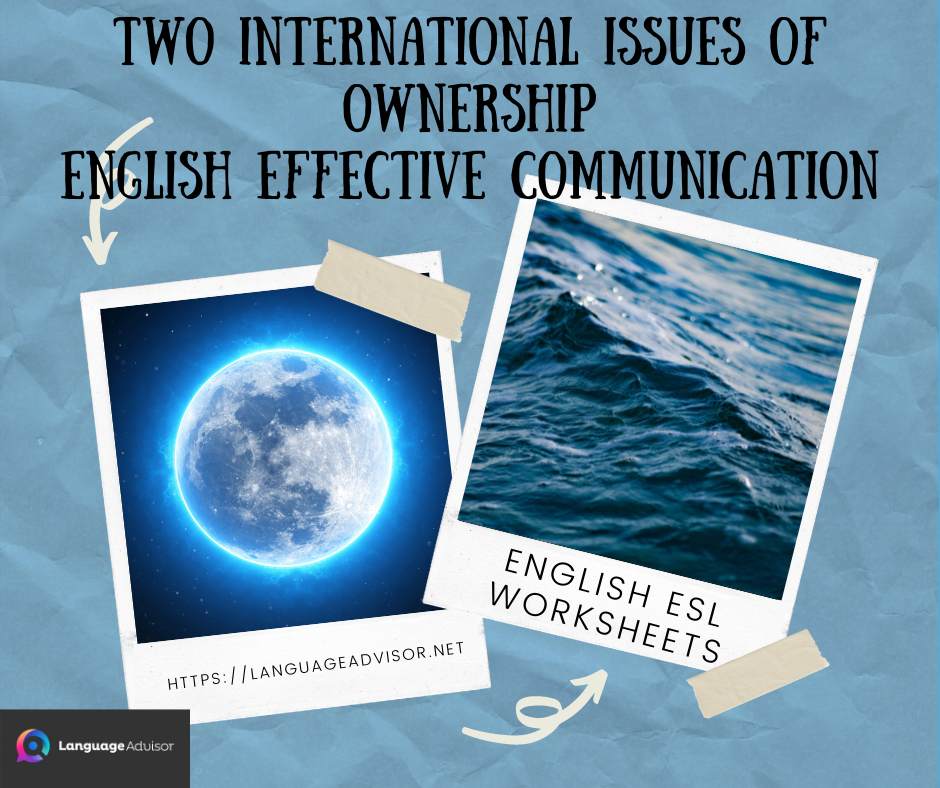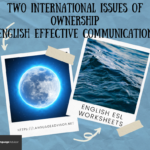Two International Issues of Ownership – English Effective Communication. English ESL Worksheets to improve reading and develop strong language and Speaking skills.
Two International Issues of Ownership – English Effective Communication

Two International Issues of Ownership – English Effective Communication
Procedure
Divide the class into pairs. Give each student a copy of either the A or B reading sheets. The students read the short articles silently by themselves and use a dictionary or consult the teacher if they don’t understand a word or phrase. After the students have read and understood the articles, the teacher takes the articles away. Then student A will communicate what was in A’s article to student B, and student B will communicate what was in B’s article to A. Then all of the students take a test to see how much information they were able to communicate.
| Who Owns the Moon? According to one website on the Internet, you can purchase some real estate on the moon at about $20.00 an acre. It sounds like a good deal. Unfortunately, even if you could legally own a piece of the moon you wouldn’t be able to get there. But can you even own a piece of the moon?In 1967, many of the countries of the world, including the major space powers of the time the U.S. and the U.S.S.R., signed a treaty on space exploration and space ownership. Article I, which is the most important article of treaty, states that the exploration and use of outer space, including the moon shall be carried out for the benefit of all countries. Article II states that countries cannot own any part of space including the moon. And so, if not even a country can own a part of the moon, how can a person buy real estate on the moon? The website that was mentioned earlier seems to be selling something that it doesn’t own.The treaty also states that space may only be used for peaceful purposes. And hence, the treaty also forbids countries from putting nuclear weapons into space. | Who Owns the Seas? Is it possible for somebody to own the seas? The laws of the seas were established in the 17th century, and remained unchanged until after WWII. In short, a country owned the seas up to 3 miles from the shore, which was the distance a cannonball could be shot. Beyond that the seas were free for everyone. Nobody could claim ownership to them. This basic law was fine up until the 20th century, but, in the 20th century, an enormous problem was created: Humans became very efficient at catching fish and exploiting the ocean. Because the seas were free, every country was catching fish, whales and other animals without limitation. As a result, the number of fish in the seas drastically decreased and many species of whales became endangered. It was clear that the oceans were being over fished. The law needed to be changed and a new treaty was made in 1983.The new treaty created an ‘Exclusive Economic Zone’ which extends for about 200 kilometers from the shore. Economic activities such as fishing are forbidden by other countries in this area. |
Two International Issues of Ownership
| (1) What is the title of the article? (2) What does one internet company do? (3) How much do they sell real estate on the moon for? (4) What did the major space countries do in 1967? (5) What two countries does the article mention that signed the treaties? (6) What is the most important article? (7) What does the article I say? (8) What does article II say? (9) What else does the treaty say the space may only be used for? (10) What is forbidden in space? | (1) What is the title of the article? (2) When were the laws of the seas established? (3) What was the basic law of the seas? (4) Why was the distance three miles important? (5) What problem was created in the 20th century? (6) What did countries do to fish and whales? (7) What happened to the number of fish? (8) What happened to the whales? (9) When was a new treaty created? (10) What did this new treaty create? (11) What is forbidden in the EEZ? |

All downloads are in PDF format





